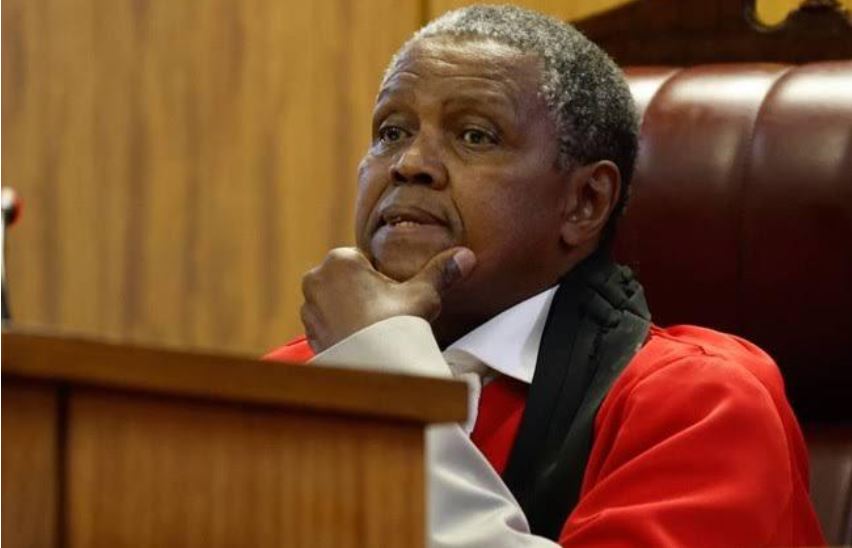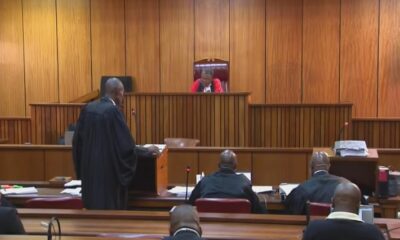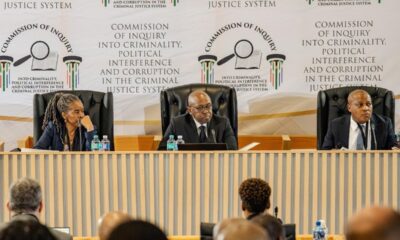News
Judge Mokgoatlheng’s Comments Spark Outrage in Senzo Meyiwa Trial

Public fury grows as legal and political figures demand accountability for ‘racially charged’ court remarks
The Senzo Meyiwa murder trial, already marked by delays and drama, took a troubling turn this past week. But this time, it wasn’t the accused or the lawyers making headlines, it was the judge himself.
Judge Ratha Mokgoatlheng, presiding over the long-running case in the Pretoria High Court, triggered national outrage after making remarks that many have described as racially offensive and professionally inappropriate.
The controversy started when one of the defence attorneys, Advocate Charles Mnisi, informed the court through official channels that he wouldn’t be present on Monday, 9 June, due to his participation in the Comrades Marathon. Mokgoatlheng’s response? A scathing outburst.
“This is what happens in a South Africa run by blacks,” the judge declared. “Even if you call Uncle Tom, I don’t think a white advocate will ever have the gall to ask me that. Never.”
The comments that broke the courtroom
While frustrations over the slow-moving trial are understandable, Meyiwa was murdered in 2014, and justice has remained elusive the judge’s comments weren’t seen as a momentary lapse.
Instead, they’ve sparked fierce backlash from across the political and legal spectrum.
Parliament’s justice committee chair, Xola Nqola, didn’t mince words: “The remarks are extremely unfortunate and a gross generalisation.” He called for an immediate withdrawal and a public apology, stating that professionalism has no colour.
Legal community calls foul
The Law Society of South Africa (LSSA) echoed these sentiments. President Nkosana Mvundlela said on Newzroom Afrika that it was especially disheartening given Mokgoatlheng’s prior history of controversial statements.
“It’s troubling when a judge, who has sworn to uphold the Constitution, makes comments that carry racial undertones,” said Mvundlela.
He added that Mnisi acted entirely within ethical bounds by communicating through the registrar a standard practice in South African courts.
“Why should ethical conduct be painted as disrespectful just because of who’s performing it?” Mvundlela asked.
Justice and race: A dangerous mix
This isn’t just about courtroom decorum. For many South Africans, it’s about trust in the system.
When a judge compares black professionals unfavourably to their white peers—especially in such a public, high-stakes trial—it stings deeply in a country still grappling with its apartheid past.
“Comments like these don’t just reflect poorly on one judge,” said Brett Herron of the Good party. “They erode public faith in the fairness of our courts.”
Herron, along with the LSSA and other legal bodies, supports a formal review by the Judicial Services Commission (JSC).
The trial that just won’t end
The Meyiwa case has become a symbol of judicial delay in South Africa. It’s been 10 years since the Bafana Bafana star was gunned down in a Vosloorus home and still, no verdict.
Judge Mokgoatlheng’s own comments reflected that frustration. He referenced the pain of the Meyiwa family and the prolonged detention of the accused.
But his anger, many argue, should have been directed at systemic inefficiencies, not his fellow black professionals.
The bigger picture: Is this a turning point?
This moment has sparked more than just social media outrage, it’s ignited a deeper conversation about race, professionalism, and respect in South Africa’s legal system.
Twitter and TikTok were ablaze over the weekend, with hashtags like #MeyiwaTrial and #Mokgoatlheng trending. While some sympathised with the judge’s stress over delays, most felt his language crossed a dangerous line.
Many South Africans have expressed exhaustion over the pace of justice. But few are willing to excuse what they see as prejudice dressed up as courtroom authority.
What happens next?
With formal complaints expected to reach the JSC in the coming days, all eyes will be on whether Mokgoatlheng will apologise or face any consequences at all.
This trial, already a lightning rod for national frustration, has now become a test of judicial accountability. And the public is watching closely.
Because justice delayed is one thing. But justice tainted? That’s another story altogether.
{Source: The Citizen}
Follow Joburg ETC on Facebook, Twitter , TikTok and Instagram
For more News in Johannesburg, visit joburgetc.com



























